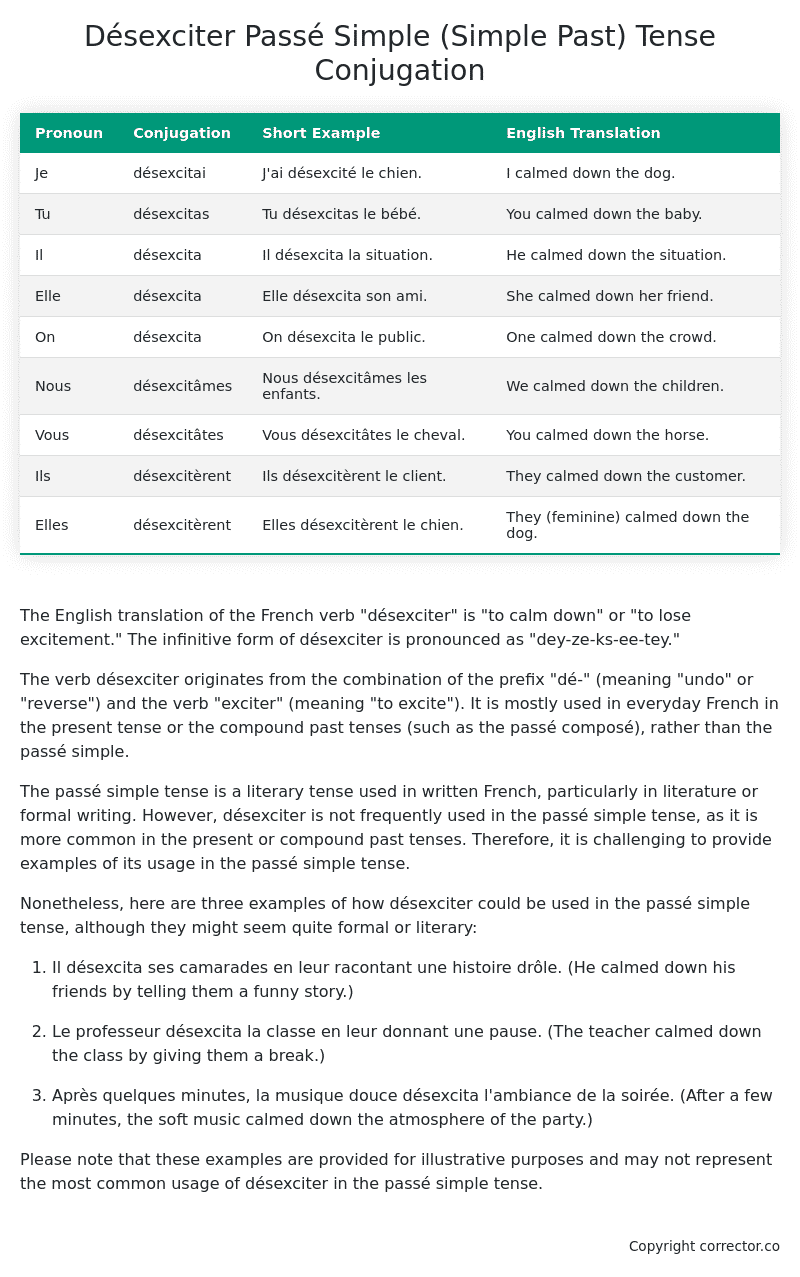Passé Simple (Simple Past) Tense Conjugation of the French Verb désexciter
Introduction to the verb désexciter
The English translation of the French verb “désexciter” is “to calm down” or “to lose excitement.” The infinitive form of désexciter is pronounced as “dey-ze-ks-ee-tey.”
The verb désexciter originates from the combination of the prefix “dé-” (meaning “undo” or “reverse”) and the verb “exciter” (meaning “to excite”). It is mostly used in everyday French in the present tense or the compound past tenses (such as the passé composé), rather than the passé simple.
The passé simple tense is a literary tense used in written French, particularly in literature or formal writing. However, désexciter is not frequently used in the passé simple tense, as it is more common in the present or compound past tenses. Therefore, it is challenging to provide examples of its usage in the passé simple tense.
Nonetheless, here are three examples of how désexciter could be used in the passé simple tense, although they might seem quite formal or literary:
-
Il désexcita ses camarades en leur racontant une histoire drôle.
(He calmed down his friends by telling them a funny story.) -
Le professeur désexcita la classe en leur donnant une pause.
(The teacher calmed down the class by giving them a break.) -
Après quelques minutes, la musique douce désexcita l’ambiance de la soirée.
(After a few minutes, the soft music calmed down the atmosphere of the party.)
Please note that these examples are provided for illustrative purposes and may not represent the most common usage of désexciter in the passé simple tense.
Table of the Passé Simple (Simple Past) Tense Conjugation of désexciter
| Pronoun | Conjugation | Short Example | English Translation |
|---|---|---|---|
| Je | désexcitai | J’ai désexcité le chien. | I calmed down the dog. |
| Tu | désexcitas | Tu désexcitas le bébé. | You calmed down the baby. |
| Il | désexcita | Il désexcita la situation. | He calmed down the situation. |
| Elle | désexcita | Elle désexcita son ami. | She calmed down her friend. |
| On | désexcita | On désexcita le public. | One calmed down the crowd. |
| Nous | désexcitâmes | Nous désexcitâmes les enfants. | We calmed down the children. |
| Vous | désexcitâtes | Vous désexcitâtes le cheval. | You calmed down the horse. |
| Ils | désexcitèrent | Ils désexcitèrent le client. | They calmed down the customer. |
| Elles | désexcitèrent | Elles désexcitèrent le chien. | They (feminine) calmed down the dog. |
Other Conjugations for Désexciter.
Le Present (Present Tense) Conjugation of the French Verb désexciter
Imparfait (Imperfect) Tense Conjugation of the French Verb désexciter
Passé Simple (Simple Past) Tense Conjugation of the French Verb désexciter (You’re reading it right now!)
Passé Composé (Present Perfect) Tense Conjugation of the French Verb désexciter
Futur Simple (Simple Future) Tense Conjugation of the French Verb désexciter
Futur Proche (Near Future) Tense Conjugation of the French Verb désexciter
Plus-que-parfait (Pluperfect) Tense Conjugation of the French Verb désexciter
Passé Antérieur (Past Anterior) Tense Conjugation of the French Verb désexciter
Futur Antérieur (Future Anterior) Tense Conjugation of the French Verb désexciter
Subjonctif Présent (Subjunctive Present) Tense Conjugation of the French Verb désexciter
Subjonctif Passé (Subjunctive Past) Tense Conjugation of the French Verb désexciter
Subjonctif Imparfait (Subjunctive Imperfect) Tense Conjugation of the French Verb désexciter
Subjonctif Plus-que-parfait (Subjunctive Pluperfect) Tense Conjugation of the French Verb désexciter
Conditionnel Présent (Conditional Present) Tense Conjugation of the French Verb désexciter
Conditionnel Passé (Conditional Past) Tense Conjugation of the French Verb désexciter
Conditionnel Passé II (Conditional Past II) Tense Conjugation of the French Verb désexciter
L’impératif Présent (Imperative Present) Tense Conjugation of the French Verb désexciter
L’impératif Passé (Imperative Past) Tense Conjugation of the French Verb désexciter
L’infinitif Présent (Infinitive Present) Tense Conjugation of the French Verb désexciter
L’infinitif Passé (Infinitive Past) Tense Conjugation of the French Verb désexciter
Le Participe Présent (Present Participle) Tense Conjugation of the French Verb désexciter
Le Participe Passé (Past Participle) Tense Conjugation of the French Verb désexciter
Struggling with French verbs or the language in general? Why not use our free French Grammar Checker – no registration required!
Get a FREE Download Study Sheet of this Conjugation 🔥
Simply right click the image below, click “save image” and get your free reference for the désexciter Passé Simple tense conjugation!

Désexciter – About the French Passé Simple (Simple Past) Tense
Formation
Usage
Narration
Historical Context
Interactions with other tenses
Passé Composé
Imparfait
Conditional and Subjunctive
Summary
I hope you enjoyed this article on the verb désexciter. Still in a learning mood? Check out another TOTALLY random French verb conjugation!


